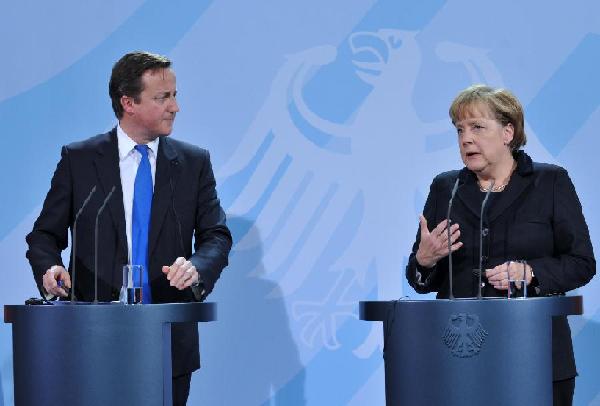Merkel, Cameron differ on euro crisis weapons
Updated: 2011-11-19 13:29
(Agencies)
|
|||||||||||
|
 |
|
German Chancellor Angela Merkel (R) and Britain's Prime Minister David Cameron address a news conference after talks in Berlin November 18, 2011. The leaders of Germany and Britain sent out different signals on Friday about how to solve the euro zone's debt crisis and admitted they had failed to narrow differences over the introduction of a financial transaction tax in Europe. [Photo/Xinhua] |
BERLIN - The leaders of Germany and Britain sent out conflicting signals on Friday about how to solve the euro zone's debt crisis and admitted they had failed to narrow differences over the introduction of a financial transaction tax in Europe.
At a news conference in Berlin, British Prime Minister David Cameron and German Chancellor Angela Merkel tried to paper over divergent views on European policy that have sparked a war of words between politicians and media in both countries.
But they could not mask differences over how the single currency bloc's debt crisis should be handled, with Cameron calling for "decisive action" to stabilise the euro zone and Merkel making clear she favoured a "step-by-step" approach.
"My German isn't that good, I think a bazooka is a Superwaffe, am I right?" Cameron said in response to a question about his call for euro zone policymakers to use a "big bazooka" approach to the crisis.
"The chancellor and I would agree that whatever you call this we need to take decisive action to help stabilise the euro zone," he said, citing the need for strong action on Greece, a rescue fund with "power and punch" and a recapitalisation of European banks.
Merkel struck a more cautious note.
She is under increasing pressure to support bolder crisis-fighting steps from the European Central Bank (ECB), such as using it as a lender of last resort for the bloc or backstop for the euro zone's bailout fund, the European Financial Stability Facility (EFSF).
So far she has resisted, backing the argument of the German Bundesbank that this would violate the ECB's inflation-focused policy mandate. Infringing on this awakes traumatic memories in Germany of the hyperinflation that followed the two world wars.
"The British demand that we use a large amount of firepower to win back credibility for the euro zone is right. But we have to take care that we don't pretend to have powers we don't have. Because the markets will figure out very quickly that this won't work," said the centre-right chancellor.
Merkel is focusing on changes to the EU's Lisbon Treaty to force other euro members to adopt German budget discipline. She believes this would convince financial markets that Europe is serious about getting its debt and deficits under control.
One German source said the two leaders discussed a possible formulation for a deal on treaty change, where Cameron would go along with Berlin's wishes in exchange for more "opt-outs" from Europe to keep eurosceptics in his Conservative Party happy.
British officials were not immediately available to confirm the discussion.
Hot Topics
HIV/AIDS, Egypt protest, Thanksgiving, climate change, global economic recovery, home prices, high-speed railways, school bus safety, Libya situation, Weekly photos
Editor's Picks

|

|

|

|

|

|







